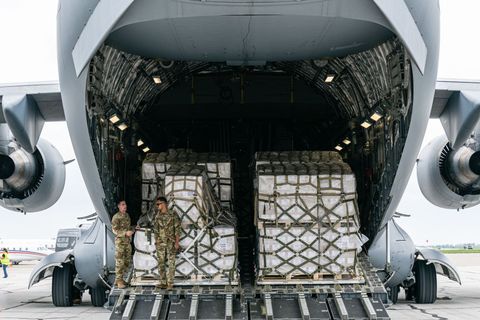- It will take as early as July for shelves to be fully stocked with infant formula, according to U.S. Food and Drug Administration (FDA) Commissioner Dr. Robert Califf.
- The FDA also announced steps that will lead to tens of millions of additional bottles of infant formula, including specialty infant formula that is in short supply for infants with certain allergies or critical health conditions.
- Bubs Australia has been granted approval under the FDA’s recent increased flexibilities and will provide at least 1.25 million cans of several varieties of its infant formula to the U.S.
Supply chain issues, labor shortages and the recent formula recall are among some of the major reasons for the baby formula shortage happening in the U.S. right now. Parents across the nation are wondering when shelves will be stocked and this crisis will end.
Last week, FDA Commissioner Dr. Robert Califf told lawmakers that although the situation continues to improve, it will take as early as July for shelves to be fully stocked. There are a few different initiatives in place that will hopefully help get formula available as quickly as possible.
“President Biden has implemented the defense production act to mandate that manufacturers help increase production of formula, the department of defense is using aircraft to fly formula to the United States from other countries, and the FDA has loosened some of its requirements for formula manufactured abroad in order to speed up the inspection process and get formula from other countries available more quickly,” says Susannah Hills, M.D., Pediatric Airway Surgeon and Assistant Professor of Otolaryngology-Head and Neck Surgery for Columbia University Medical Center.
On Tuesday and Thursday, the FDA also announced steps that will lead to tens of millions of additional bottles of infant formula, including specialty infant formula that is in short supply for infants with certain allergies or critical health conditions. But Wendy Sue Swanson, M.D., M.B.E., F.A.A.P., Pediatrician and Chief Medical Officer of SpoonfulONE, suspects it will still be months until we see significant relief for families.
Another major development is that Abbott will be reopening its factory in Michigan. “On May 16, the FDA and Abbott reached an agreement to restart production at the company’s Michigan facility, which should help ease the shortage. However, it can take six to eight weeks after the start of production until the newly-produced formula appears in stores,” says Dr. Swanson.
“The bottom line is that Abbott carries a huge portion of the market — nearly 50% — and with one of their four factories down, the national supply of formula will be severely impacted until that factory is up and running again,” Dr. Hills notes.
How does international formula play a role in ending the shortage?
The FDA recently approved infant formula from Bubs Australia, British formula company Kendamil and Nestle NAN SupremePro under the agency’s recent increased flexibilities, which Dr. Swanson hopes will hopefully move timelines up. Bubs Australia plans to provide at least 4.6 million 8-ounce bottle equivalents of formula, and Kendamil has committed to ship 3.7 million 8-ounce bottle equivalents of formula to the U.S. beginning in June. “There’s no question that having supply of formula from abroad is critical and will be extremely helpful,” Dr. Hills says.
Tanya Altmann, M.D., F.A.A.P., Founder of Calabasas Pediatrics and best-selling author of What to Feed Your Baby, also says that we have to be prepared that it could take months to truly get on the other side of this crisis. “I am thankful and excited that international brands are stepping up to help solve the formula shortage crisis in the U.S.,” adding that the first shipment from Bubs Australia is set to depart Melbourne on June 9 and that other international manufacturers will also be sending shipments under Operation Fly Formula and domestic manufacturers are ramping up production.
“Even with everyone working 24/7 together to help increase infant formula supply in the U.S., it is difficult say exactly when the shortage will end,” Dr. Altmann shares. “Once store shelves are re-stocked, it’s going to take time for families to trust that the shortage is easing up. So, we could see some parents pantry stocking which could continue to prolong the shortage.”
Dr. Swanson says that global companies like Nestle Health Science are working to help support the shortage, and have imported approximately 1.5 million 8-ounce bottles into the U.S. market for children. “They prioritized Nestlé Health Science Alfamino Infant and Alfamino Junior products because they serve a critical medical purpose as they are for children with cow’s milk protein allergies.”
What to do if you run out of formula:
Infant nutrition is crucial for healthy development and safety, and Dr. Altmann offers a few do’s and don’ts for parents during this difficult time.
- DO switch brands if your routine formula isn’t available. “It can take a baby a few days to transition to the new formula so be patient. If your baby is on a specialty formula, or has an allergy or sensitivity to any formula, always talk to your pediatrician before switching,” Dr. Altmann advises.
- DO ask friends and families in other states to help find your formula or an equivalent.
- DO introduce a nutrient-rich toddler formula with no added sugars if your baby is close to a year old, eating a healthy diet of solid foods and you’ve consulted with your pediatrician.
- DO check with breast milk donor banks
- DO ask about the increased flexibility WIC recipients have to purchase your formula of choice.
- DON’T make homemade infant formula. “It won’t meet your baby’s essential nutritional needs, can be very dangerous to their growth and development and can even make your baby sick,” Dr. Altmann says.
- DON’T add extra water to stretch your formula supply. Dr. Altmann adds that this will dilute essential nutrients which can lead to major health problems and harm the normal growth and development of the infant.
If you’re wondering about whether or not it’s safe to give your baby cow’s milk, Dr. Swanson says that if your child is older than 6 months of age, you can feed them whole cow’s milk for a brief period of time until the shortage is better. “This is not ideal as cow’s milk provides a deficiency of key vitamins and minerals for infants, especially iron which has a critical role in neurocognitive development.” Although drinking cow’s milk in this shortage should not become routine for an infant of any age, Dr. Swanson says it is a better option than diluting formula or making homemade formula.
Preventing future shortages:
“A formula shortage like this is really a public health emergency,” Dr. Hills says. “This process is really highlighting the risks of having a single manufacturer hold such a large portion of the market. Encouraging other companies to develop a manufacture formula is very important, and having redundancy within companies with the larger share of the market is also important.” She also thinks that the government should create a national stockpile of formula “just like we do for medications, vaccines, and other supplies needed in other potential public health emergencies.”
Dr. Swanson says that ongoing awareness of how critical infant formula is to pediatric nutrition, as well as ongoing partnerships with pediatric and nutrition experts alongside regulators at the FDA are all crucial. “I think the Bobbie formula company has done a great job highlighting some of the main changes that need to happen, which include increased FDA funding to enhance infant formula notification approvals, diversifying manufacturing, and increasing access and options for those on WIC.
“Hopefully we will see ongoing openness to safe and healthy formula from around the world, as needed,” Dr. Swanson adds. International brands that are stepping in provide tremendous hope for parents during this difficult time and moving forward. “While we are focused on working alongside other brands to bring much-needed relief to American families as quickly as possible, we look at this period as a continuation of our long-term commitment to the U.S. market,” says Kristy Carr, CEO and Founder of Bubs Australia & Aussie Bubs. “We believe there is a long-term role for global manufacturers like Bubs Australia to offer American families clean, safe products that meet the nutrient requirements of the U.S. Infant Formula Act.”
This content is created and maintained by a third party, and imported onto this page to help users provide their email addresses. You may be able to find more information about this and similar content at piano.io

